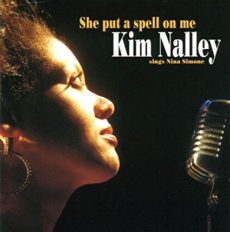
Daily Dose Of Jazz…
Kim Rene Nalley was born November 14, 1971 in San Francisco, California but was raised in New Haven, Connecticut in a musical family that includes jazz drummer and photographer Reggie Jackson and R&B guitarist-vocalist Earl Whitaker. She received piano lessons from her great-grandmother and originally pursued classical voice, studying drama and opera at the Educational Center for the Arts in New Haven. She went on to study classical music at Holy Cross in Worcester, Massachusetts.
At Holy Cross, Nalley sang with the power rock combo The Limit, which featured Crusader musicians Garrett Scott Flynn, Steve Guerette, Jim Januzzi, Allan Harper and Anthony O’Donnell. Switching to jazz shortly after moving to San Francisco, while attended UC Berkeley, she sang in the Cal Big Band, as well as receiving a See’s Candy’ Scholarship for Outstanding Musicianship.
Kim performed weekly at the Alta Plaza and director Michael Tilson Thomas discovered and recorded her in concert and hired her to sing a program of Gershwin tunes with the San Francisco Symphony. She began performing with the Johnny Nocturne Band for the Rounder/ Bullseye label, went on national and international tours, relocate to Switzerland, but returned to save the club Jazz at Pearl’s from going out of business.
Citing the Little Rascals and Bug Bunny cartoons as her seminal jazz influences, jazz and blues singer, actress, historian and former Jazz at Pearl’s club owner Kim Nalley, known for her powerful 3½ octave range, scatting, r&b, spirituals and folk guitar, continues to perform and record.
More Posts: vocal
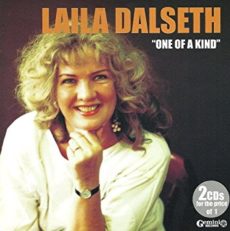
Daily Dose Of Jazz…
Laila Dalseth was born on November 6, 1940 in Bergen, Norway and after an early debut in her hometown she joined the Oslo jazz scene, and recorded with among others Kjell Karlsen, Egil Kapstad and Helge Hurum’s big band.
Dalseth recording debut in the Seventies was with the Metropol Jazz, participated in Stokstad/Jensen Trad.Band, in a band with Per Borthen, as well as at Teatret Vårtin the play Havhesten through the decade. She has with her own band released Listen Here!, One of a Kind and then Everything I Love, all on the Gemini Records label. Her group, L. D. Quintet consisted of husband Totti Bergh on saxophone, Per Husby on piano, Kåre Garnes on bass and Tom Olstad on drums.
Dalseth was awarded Buddyprisen, and three times was awarded the Spellemannprisen i klassen jazz, for Just Friends 1975, Glad There is You 1978 and Daydreams 1984. She was internationally recognized for the record Time for Love with Red Mitchell and Travelling Light with Al Cohn both in 1986, The Judge and I in 1991 with Milt Hinton, A Woman’s Intuition 1995 with her own sextet featuring Philip Catherine, We Remember You 1986/2003 with Al Cohn, and Everything I Love in 2004. Five of these releases were critically ranked among the Ten best jazz albums of the year» by the American jazz magazine Cadence.
Jazz vocalist Laila Dalseth continues to perform and record at the age of 77.
More Posts: vocal
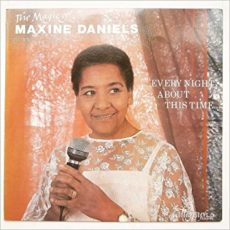
Daily Dose Of Jazz…
Maxine Daniels was born Gladys Lynch in Stepney, London on November 2, 1930, one of thirteen children and the elder sister of entertainer and singer Kenny Lynch. She first received recognition as a singer when she won a local talent contest, at the age of 14, in a Stepney cinema. That local recognition lead to a first singing job with a semi-professional band led by a Canning Town grocer. She then won another talent competition organized by the Daily Sketch and sponsored by bandleader Ted Heath.
A two year residency followed from 1954 to 1956 with bandleader Denny Boyce at The Orchid Room in Purley. At Boyce’s suggestion she changed her stage name and through their regular Radio Luxembourg broadcasts she gained a wider audience and the opportunity to record for the Oriole label.
Over the course of her career vocalist Maxine Daniels recorded eleven albums, and worked with Humphrey Lyttelton. She passed away on October 20, 2003 in Romford, England at the age of 72.
More Posts: vocal
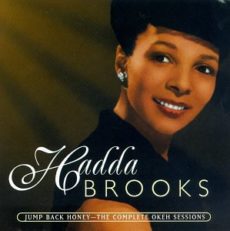
Daily Dose Of Jazz…
Hadda Brooks was born Hattie L. Hapgood on October 29, 1916 in Los Angeles, California. Raised in the Boyle Heights area by her parents who had migrated from the South her mother, Goldie Wright, was a doctor and her father, John Hapgood, a deputy sheriff, but it was her grandfather, who introduced her to theater and the operatic voices of Amelita Galli-Curci and Enrico Caruso. In her youth she formally studied classical music with an Italian piano instructor, Florence Bruni, with whom she trained for twenty years.
She attended the University of Chicago, later returned to Los Angeles, becoming to love the subtle comedy of black theater and vaudeville entertainer and singer Bert Williams. She began playing piano professionally in the early 1940s at a tap-dance studio owned by Hollywood choreographer and dancer Willie Covan. For ten dollars a week, she played the popular tunes of the day while Covan worked with such stars as Fred Astaire, Gene Kelly, and Shirley Temple.
Preferring ballads to boogie-woogie, Brooks worked up her style by listening to Albert Ammons, Pete Johnson, and Meade Lux Lewis records. Her first recording, the pounding Swingin’ the Boogie, for Jules Bihari’s Modern Records, was a regional hit in 1945, and her most famous song Out of the Blue, the title track to the film of the same name she appeared in on the recommendation of Benny Goodman.
She went on to begin singing with the encouragement Charlie Barnet, and recorded her first vocal recording You Won’t Let Me Go, played the small part of a lounge piano player in films, and was the second Black woman to host her own television show in 1957 with The Hadda Brooks Show after The Hazel Scott Show on DuMont in 1950. She toured Europe, Australia
In the 1970s, she commuted to Europe for performances in nightclubs and festivals, but performed rarely in the United States, living for many years in Australia and Hawaii. Retiring from music for sixteen years, she resurfaced to open Perino’s in Los Angeles and clubs in San Francisco and New York City as well as resuming her recording career. She continued appearing in films throughout the rest of her career, received the Pioneer Award from the Smithsonian and the Los Angeles Music Awards honored her with the Lifetime Achievement Award.
Pianist, vocalist and composer Hadda Brooks, who got her name from Jules Bihari, passed away Los Angeles, following open-heart surgery at age 86 on November 21, 2002.
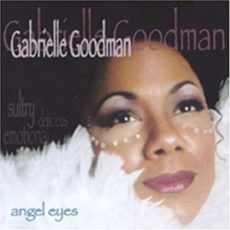
Daily Dose Of Jazz…
Gabrielle Goodman was born on October 23, 1964 in Baltimore, Maryland and raised in a musical family. Her mother was a classical singer and her father was a jazz trombonist. She attended Peabody preparatory school and briefly Oberlin College before transferring to the Peabody Institute Conservatory, where she studied until graduating in 1990 under the direction of Alice Gerstl Duschak and Gordon Hawkins.
As a protege of Roberta Flack she began her international performance career as a backing singer for the singer in the mid-1980s and continued to tour and record with the legend for several years opening for Miles Davis, Ray Charles, the Crusaders and among others in Japan, Switzerland and Brazil.
Her first break as a solo recording artist came when she was lead singer on producer Norman Connors 1988 album Passion on Capitol Records. She later recorded two albums Travelin’ Light and Until We Love on the JMT/Verve label with German producer Stefan Winter that feature her with Kevin Eubanks, Christian Mcbride, Gary Bartz, Gary Thomas, and Terri Lyne Carrington. Gabrielle has gone on to work with Walter Beasley, David Bunn, Tony Bunn, Patrice Rushen, Dee Dee Bridgewater, Michael Bublé, Patti Labelle, Nona Hendryx, Jennifer Hudson, Mary J. Blige, Freddie Jackson, Brian Ferry, Chaka Khan and the late George Duke.
As an educator she has held the position of associate professor of voice at Berklee College of Music and in-between vocalist Gabrielle Goodman continues to record and perform.
More Posts: vocal





